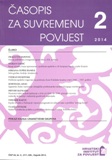Utjecaj politike na crnogorski igrani film u XX. stoljeću
THE IMPACT OF POLICY ON THE MONTENEGRIN FILM IN THE 20TH CENTURY
Author(s): Dragutin PapovićSubject(s): History
Published by: Hrvatski institut za povijest
Keywords: politics; film; ideology; “Lovčen-film”; “Film Studio”; “Zeta-film”; socialism; censorship
Summary/Abstract: As early as 1922, the political and propaganda purposes of the Montenegrin film were visible when the first Montenegrin film was produced under the title “Resurrection is impossible without death.” After the Second World War, the socialist government had noted that the film was a powerful tool in the political and ideological propaganda and that it was important for the development of culture. Therefore, in the period of socialist government, Montenegrin film experienced a strong rise. The company for production and distribution of films was formed. Then in 1945, the government had influenced the entire film industry by promoting the values of socialist ideology, politics of the Communist Party and the League of Communists of Montenegro. That was especially visible in the following films: “The Wailing Mountain”, “Marriage”, “Peaks of Zelengora” and especially “13th July”, which was the most expensive film in the history of the Montenegrin film. All films, regardless of whether they were explicitly seen as the more valuable by the socialist system, had to pass censorship and had to comply with the policy objectives of the ruling party and the socialist system. That concerned the film censorship. Film companies formed censorship authorities which controlled local production and import of foreign films. Between 1973 and 1989, the Reviewing Commission for film was giving consents or imposing a ban on the display of domestic and foreign films, simply on the basis of political preferences.
Journal: Časopis za suvremenu povijest
- Issue Year: 46/2014
- Issue No: 2
- Page Range: 223-242
- Page Count: 20
- Language: Croatian

